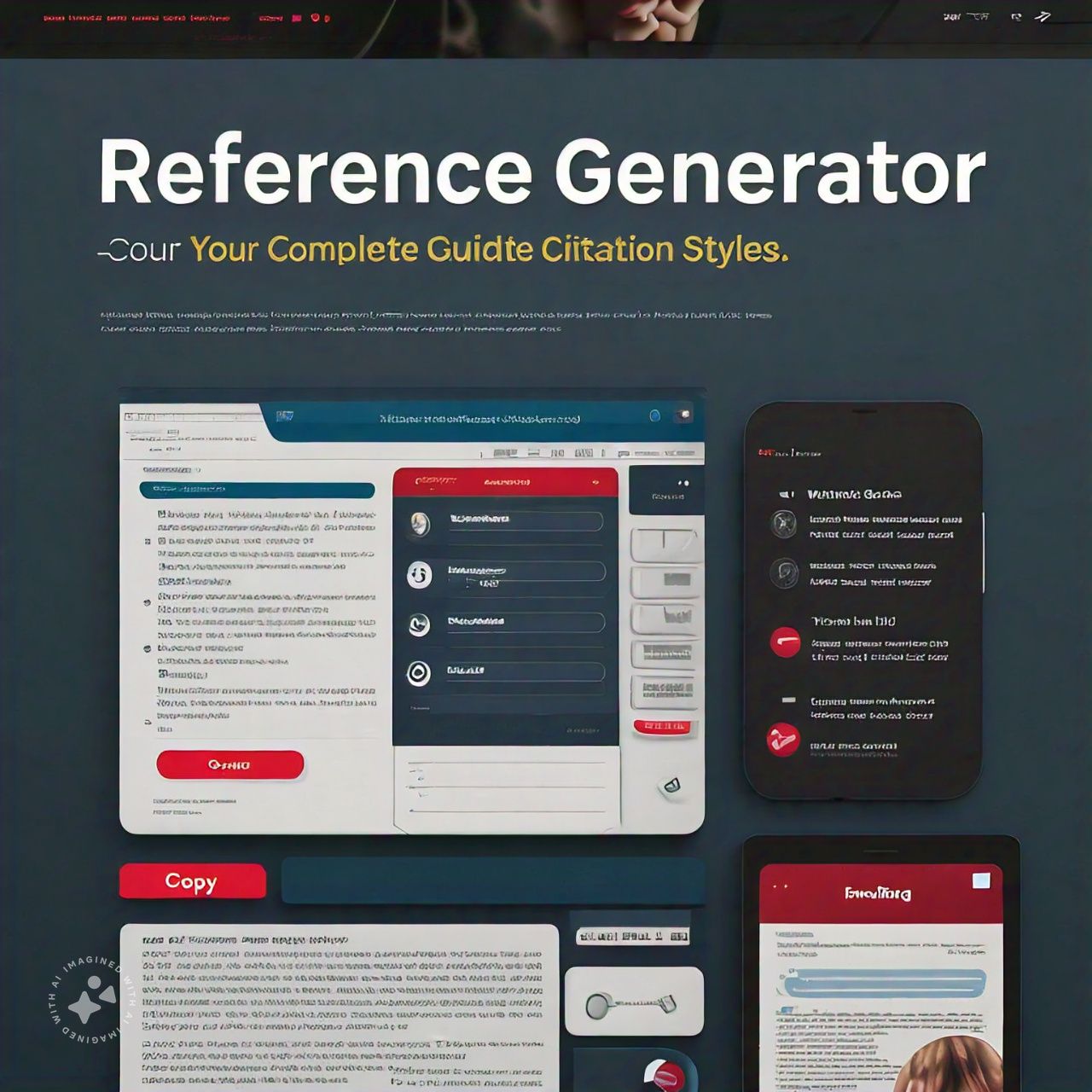Harvard Reference Generator – Your Complete Guide to Citation Styles

Master the art of Harvard Referencing with our comprehensive guide. Learn how to use a Harvard reference generator for accurate citations in the UK.
Introduction to Harvard Referencing
Harvard referencing is one of the most commonly used citation styles in academic writing, particularly in the UK. It’s a key aspect of maintaining academic integrity by giving proper credit to the sources of information. Whether you’re writing a dissertation, essay, or research paper, understanding Harvard referencing is essential. This guide will explore how a Harvard Reference Generator can simplify your citation process and ensure accuracy.
What is a Harvard Reference Generator?
A Harvard Citation Generator is an online tool that automatically creates accurate citations in the Harvard style. It generates references for a wide variety of sources, from books to websites, helping you save time while ensuring your work adheres to proper academic guidelines.
Why Use a Harvard Citation Generator?
Using a citation generator eliminates the hassle of manually formatting references, especially when you’re working under tight deadlines. For students and academics in the UK, tools like these ensure the proper structure for Harvard referencing is followed, reducing the chance of errors in your bibliography or in-text citations.
How to Use a Harvard Citation Generator
A Harvard Reference Generator is simple to use. Here’s a quick step-by-step guide:
- Select the type of source (e.g., book, journal, website).
- Input the necessary details, such as author, title, publication date, and more.
- Click ‘Generate’ to get the properly formatted citation.
- Copy and paste the citation into your bibliography or reference list.
Key Features of a Harvard Referencing Generator
- Accuracy: It provides precise citations, adhering to the latest Harvard formatting rules.
- Multiple Source Support: Generates citations for books, journals, websites, and more.
- Customization: Some tools allow you to tailor the reference format to your specific requirements.
- Quick In-Text Citations: Harvard in-text citation is generated alongside the full reference for quick insertion into your text.
Common Mistakes to Avoid While Using Harvard Citation Generators
Although these tools are highly accurate, users should still check for these common errors:
- Incorrect author names or initials.
- Misformatting of the publication year.
- Over-reliance on automation without reviewing the final citation.
Always cross-reference the output of a Harvard citation generator with your institution’s specific guidelines to avoid mistakes.
How to Cite Different Sources Using Harvard Style
Books
To cite a book, the Harvard format requires the following: Author(s). (Year). Title of the book. Edition (if not the first). Place of publication: Publisher.
Example:
Smith, J. (2021). The Science of Success. 2nd ed. London: Academic Press.
Journal Articles
Author(s). (Year). ‘Title of the article’, Title of the journal, Volume(Issue), pages.
Example:
Brown, T. (2020). ‘The impact of technology on learning’, Journal of Education Studies, 15(3), pp. 45-59.
Websites
The Harvard style for citing websites is: Author(s). (Year). Title of webpage. Available at: URL (Accessed: Date).
Example:
Jones, M. (2019). Advancements in AI. Available at: https://www.techsite.com (Accessed: 15 September 2024).
Online Reports
Author(s). (Year). Title of report. Place of publication: Publisher. Available at: URL (Accessed: Date).
Videos & Podcasts
Host/Director. (Year). ‘Title of the video or podcast’. Platform Name. Available at: URL (Accessed: Date).
Harvard In-Text Citations: A Quick Overview
Harvard in-text citations include the author’s surname and publication year, like this: (Smith, 2021). If quoting directly, add a page number: (Smith, 2021, p. 45). The Harvard in-text citation is crucial for supporting your arguments and referencing the original sources of information.
Differences Between Harvard and APA Referencing Styles
Although Harvard and APA are similar, there are key differences in formatting, especially regarding the author’s name and date placement. For instance, Harvard style places the year after the author’s name in both the reference list and in-text citation, while APA has more specific rules for referencing electronic sources and direct quotes.
APA Reference Generator vs. Harvard Citation Generator
Both the APA reference generator and Harvard citation generator are excellent tools for automating references. However, if your institution requires Harvard referencing, ensure you’re using the correct tool as APA differs in structure and format, especially when it comes to in-text citations and website references.
How to Cite a Website Using Harvard Style
To cite a website using Harvard style, include the author (if available), year, title of the webpage, and the URL, as well as the date you accessed it. Make sure to double-check that all online sources are formatted correctly, as online citations are particularly prone to mistakes.
Harvard Referencing for Different Types of Academic Work
Whether you’re writing a dissertation, essay, or research paper, Harvard referencing is essential. Each type of work may require different citation structures, but a good Harvard referencing generator ensures consistency across all formats.
Advantages of Using an Online Reference Generator
- Saves time on formatting.
- Ensures academic credibility.
- Reduces human error.
- Provides consistency across citations.
Free vs. Paid Harvard Citation Generators – Which is Better?
Free generators are widely available and are often sufficient for basic citation needs. However, paid generators may offer additional features, such as saving multiple projects, formatting different citation styles, or exporting bibliographies.
Conclusion: Master Harvard Referencing with Ease
Using a Harvard reference generator simplifies the citation process and ensures your academic work adheres to the highest standards. Whether you need to cite a website, journal, or book, an online generator will save time and reduce errors, giving you peace of mind when submitting your assignment.
Frequently Asked Questions (FAQs) on Harvard Reference Generator
A Harvard Reference Generator is an online tool designed to help students and researchers automatically generate Harvard-style citations for books, articles, websites, and other sources. It saves time and ensures that references are formatted correctly.
Yes, many Harvard citation generators are available for free online. They allow you to quickly create citations without any cost. However, some advanced tools offer premium features such as saving multiple projects or exporting entire bibliographies for a fee.
Simply select the type of source (book, website, article, etc.), input the necessary details (author, title, date, etc.), and the generator will provide a properly formatted Harvard reference that you can copy and paste into your bibliography.
Yes, Harvard reference generators also generate in-text citations. These include the author’s last name and publication year, formatted correctly for use within the body of your academic paper.
You can cite a wide variety of sources, including books, journal articles, websites, reports, online videos, podcasts, and more using the Harvard style citation generator.
No, using a Harvard citation generator is not plagiarism as long as you use the tool to properly credit the original sources of your information. The generator helps you avoid plagiarism by correctly formatting citations.
Yes, you can cite websites using Harvard style. The citation typically includes the author (if available), year of publication, title of the webpage, URL, and the date of access.
To cite an online report in Harvard style, you need the author, year of publication, title of the report, place of publication, publisher, and the URL of the report. The Harvard Reference Generator will automatically format this for you.
To cite a journal article using Harvard style, you will need the author(s), year of publication, title of the article, journal name, volume, issue number, and page range. The citation generator will format this information for you.
Yes, the Harvard Reference Generator can be used for essays, dissertations, research papers, and any other academic work that requires citations in the Harvard format.





